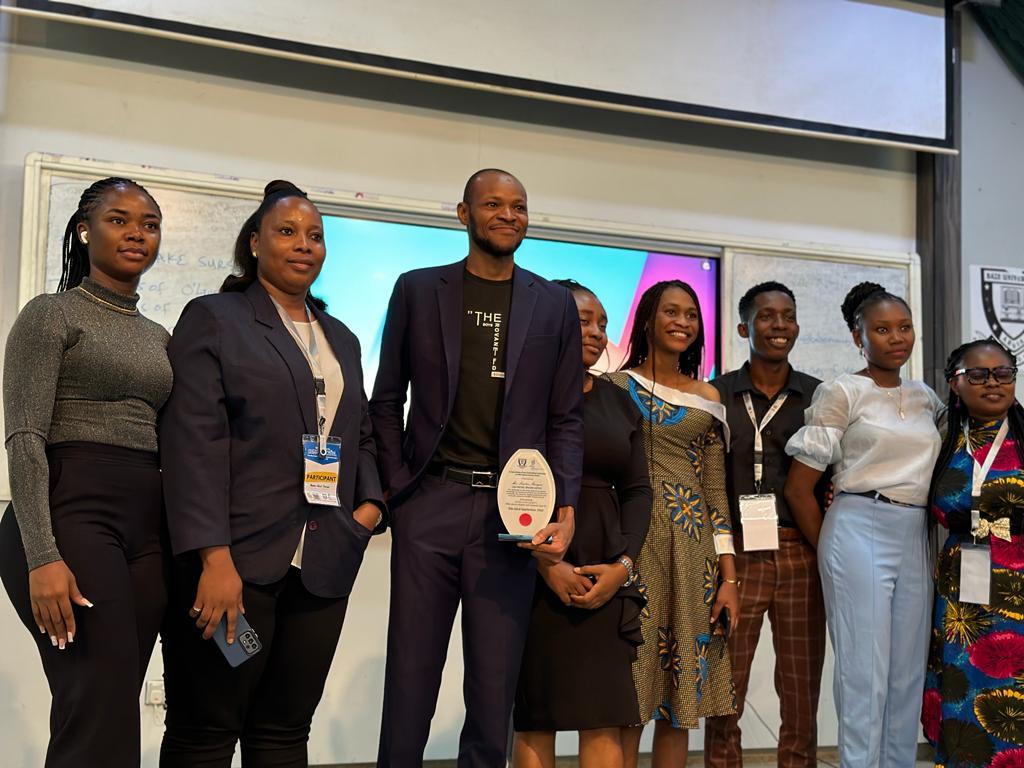
The human mind and its creations
The human mind is the most powerful creation ever. The ability of this ‘natural computer’ to create and innovate is limitless. It is both beautiful and boundless. Without this natural intelligence that the human mind represents, there will indeed be no artificial intelligence today.
Curiously—and perhaps, not coincidentally—while intellectual property (IP) is defined to mean the creations of the human mind (WIPO), information technology (IT) is defined to mean the science and activity of using computers and other electronic equipment to store and send information (Cambridge Dictionary). This is where intelligence meets information; the soul meets data; the heart meets machines. Together, innovation is born.
I love innovation.
And I have always believed that IP and IT are the two most powerful tools in the 21st century. This is because, in my opinion, they can help unleash the power of innovation the most. And digitization, digitalization, and decentralization—what I refer to as the 3Ds of the digital economy—will make this increasingly so.
Combined, IP and IT can be leveraged by economies to grow, explore, protect, maximize, and support innovation. Personally, I believe that IP and IT together offer the most exciting opportunity to transform lives in the knowledge economy and the digital age.
This is why I was delighted to accept an invitation from the World Intellectual Property Organization (WIPO) to speak on ‘IP and Emerging Technologies: Issues and Challenges’.
IP and Emerging Technologies: Issues and Challenges
I found the topic irresistible! I flew—yes, in every sense of the word—to the WIPO Summer School, Baze University, located in Abuja, Nigeria’s federal capital.
Though the WIPO Summer School kicked off 11 September, I presented my lecture on Wednesday 19 September 2023. The audience was a fair mix of professionals, lecturers, and undergraduates. This mix couldn’t have been better (except maybe having more innovators in the room).
I had an amazing time. Absolutely amazing time.
From artificial intelligence (AI) to Internet of Things (IoT), 5G to augmented reality (AR), virtual reality (VR) and mixed reality (MR), blockchain to quantum computing, I highlighted the issues and challenges IP faces in today’s world. I had some time to illustrate my points with recent developments in this area.
The elephant in the room
As might be expected in the field of IP and emerging technologies, most of these developments were drawn from outside Nigeria. In the Q&A session, one of the virtual participants asked why I didn’t include local cases involving IP and emerging technologies as well.
This was a good question.
My response, paraphrased, is below:
How many companies or brands listed on the Nigerian Exchange are manifestly leveraging IP and emerging technologies for business growth?
This question—a probing one—turned out to be a rhetorical question in the room. And the elephant in the room, eventually. The “Ajanaku, who looks backwards with difficulty like a man with a stiff neck: / Elephant, who has a head pad but carries no load, / Elephant, whose burden is the huge head he balances”. But unlike the elephant in this oral poem, ‘Salute to the Elephant’, I have no salute for this elephant in the room.
Most innovators and industrialists in Nigeria—and Africa generally—are not investing in IP and emerging technologies as their counterparts do. This essentially makes us a commodities market, not an innovation marketplace where sustainable wealth can be achieved in an innovation-based ecosystem. We lack—in most part—the knowledge infrastructure. And our lean public purse continues to pay for foreign infrastructure, investing too little in our own knowledge.
Research & Development (R&D), in both private and public sectors, remains underfunded in Nigeria and most developing countries. The result? Lack of global competitiveness. Economic consequences? Poverty. Underemployment and unemployment. Political consequences? Instability and insecurity. At best, we experience economic growth, but without economic development.
My challenge to innovators and policymakers?
We need to create wealth. Collective wealth. To create wealth, we must take innovation development more seriously in this part of the world. I don’t think we are taking it seriously enough. Public sector thinks innovation is private-sector business only, and the private sector thinks the public sector is anti-innovation. Whereas what we need is a public-private partnership (PPP) where the public sector focuses on innovation-friendly policies and the private sector builds innovation-driven products and services.
In today’s digital economy, innovators can leverage IP and IT for business growth and development, while policymakers and regulators drive IP and IT policies as a development tool.
The idea of “leapfrogging Africa” is not the solution. This only buys us a minute in a lifetime. We can no longer afford to waste more time. If we fail to invest in science and technology; invest in creativity and innovation, we will only croak around the globe like a frog, begging for foreign investment and foreign aid, while the clock ticks against us. Umar Buba Bindir, former Director-General of the National Office for Technology Acquisition and Promotion (NOTAP), also reinforced this point in his presentation at the WIPO Summer School.
I’ll continue to work with and collaborate with innovators and policymakers in Africa who are rewriting our stories. Our own stories.
The Conclusion
- New technologies will continue to emerge, and so will issues and challenges for IP.
- Policymakers must strike a balance between incentivizing creativity and innovation and enabling access in order to encourage more investments in creativity and innovation while also promoting the public interest.
- While existing IP frameworks are inadequate to address the new issues and challenges posed by emerging technologies, existing laws can still address these issues and challenges based on case-by-case judicial interpretations.
Testimonial
If feedback—both at the program and after—is anything to go by, my ultimate goal of stimulating the participant’s interest in IP and emerging technologies was well accomplished. Excellently accomplished. An onsite presentation, my lecture was engaging, interactive, and stimulating. The Q&A session too.
Below is a testimonial by Nissi B. Bindul, one of the WIPO Summer School participants:
“At the beginning of WIPO Summer School, we were asked to select groups and presentation topics. Ordinarily I would have gone for music, fashion and gaming but considering the way and manner in which the world is transforming digitally and technology-wise, I settled for IP and Emerging Technologies with little knowledge of what it entailed. It was exhilarating for my team and I to research Intellectual Property and Emerging Technologies. Until Senator Ihenyen came along that beautiful morning.
We came ready to learn, and we really did learn. We had the privilege of receiving lectures on IP and Emerging Technologies from Mr. Ihenyen, the esteemed Lead Partner of Infusion Lawyers. He totally blew our minds with his knowledge about the subject. It was super cool to hear that even people outside our group thought his lectures were the best. Listening to Mr. Ihenyen made our research a breeze and gave us a clear path to follow. This experience was seriously the highlight of my WIPO experience. I was completely engrossed in his insightful talk, and my thoughts were going wild. His lectures sparked so many ideas in my brain. We have so many responsibilities in this field.
But guess what? We actually got to present at the United Nations and interact with other experts. And I’m proud to say our presentation was the best at the summer school. We owe it all to Mr. Ihenyen for giving us such a unique perspective on the topic. The guy is a genius at what he does. Our knowledge game was on a whole other level.
I am pleased to share that I, along with a group of individuals, have been honoured with the esteemed title of ‘We Win IP Ambassadors’ during our recent presentation at the United Nations. This significant recognition was bestowed upon us as part of the empowering women in intellectual property initiative, led by the esteemed Nigerian Copyright Rights Commission. I am particularly thrilled about my upcoming training to become an IP lawyer, with a special focus on ICT.”- Nissi B Bindul
Beautiful. Simply beautiful. Like sunflowers. Sunlight. Photosynthesis. IP doesn’t get sweeter and more memorable than this!
Equally memorable are photos from the WIPO Summer School. (I’ll load more as soon as they drop!)

With the IP and Emerging Technologies Team, the ‘We Win IP Ambassadors’

Left to right: Amarachi Okpara, legal practitioner; and Shukurat Amosa, IP advocate

On my left right: Dr. Bridget Anigbogu, Baze University Lecturer; Ufoma, Baze University IP Club President; and Precious Chiamaka Onuabuchi, Co-winner of National IP Arbitration Competition, 2023
Award by Baze University
An award plaque was presented to me by Baze University for my “outstanding contribution to WIPO-Nigeria Summer School”:
Your dedication to advancing intellectual property knowledge and fostering innovation has enriched our community. We extend our deepest gratitude for your invaluable service to the WIPO Summer School.

I’m grateful to WIPO for the opportunity to impart knowledge in the Baze University community. I’m also grateful to Baze University for making this a success. Let’s do this again!
To download the PowerPoint presentation, click here.
And feel free to drop a comment or message!
3 Comments
Leave A Comment
Copyright © 2025 Senator Ihenyen. All rights reserved. Designed by Beacon Lanbs & Tech Solutions

01/10/2023
Congratulations, sir. I am delighted to have had the opportunity to learn from you. I eagerly anticipate the valuable content you will provide in this platform. Happy Independence Day.
01/10/2023
Thank you very much, Nissi.
01/10/2023
Thank you for sharing, Senator.
“Public sector thinks innovation is private-sector business only, and the private sector thinks the public sector is anti-innovation. Whereas what we need is a public-private partnership (PPP) where the public sector focuses on innovation-friendly policies and the private sector builds innovation-driven products and services”. Very well said.
We have a lot to do in this field.